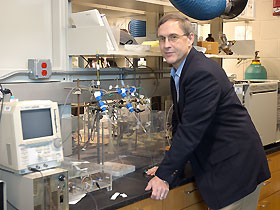For more archives, go to the Advance Archive/Search Page.
$4.2 Million Gift Establishes
Chair In Plasma Chemistry
Yuji Hayashi, founder and CEO of the firm I’mPACT World, has made a $4.2 million gift to the University establishing the Yuji Hayashi Distinguished Chair in Plasma Chemistry and creating Yuji Hayashi Fellows within the chemistry department. The gift, which will establish the second distinguished chair and first endowed fellowships in the department, is eligible to receive a 50 percent match under the state’s endowment gifts program.
 |
|
Steven Suib, professor of chemistry, works with plasma assisted catalytic
technology (PACT) apparatus in his lab. |
A recognized expert in the field of plasma chemistry, Hayashi aims to bring engineering technology into better harmony with nature, and restore balance to a world being damaged by the growth of modern civilization. “The ‘I’ in I’mPACT World is taken from the Japanese character for engineering, itself evocative of balance,” he says. “Engineering should not solely impact nature; the two should interact synergistically.”
Hayashi is working with Steven Suib, professor and head of UConn’s chemistry department, who is also one of the few experts in the field of plasma chemistry. One of their top priorities is to develop the ability to create plasma at normal atmospheric pressure (or 1 atm).
I’m PACT’s gift, the first the firm has made to an institution of higher education, will bring the two scientists a significant step closer to that goal. “In Japan,” says Hayashi, “we have many students conducting research in plasma chemistry and related areas of engineering. One of my goals is to work with Professor Suib to help build such a program here, through scientific collaboration, which will expand the field more rapidly.”
University President Philip E. Austin, says, “The Hayashi Chair, the first of its kind in the nation, is a remarkable resource, helping to build a foundation for further scientific advancement in this young and exciting field. The Chair, highly visible in the scientific and academic community, will be a catalyst in developing new science, attracting the best scientific minds – accomplished faculty and bright students alike – to UConn.”
The acronym “PACT” in the company’s name stands for “plasma assisted catalytic technology.” This technology has the potential not only to benefit millions of people, but to help reverse some of the damage that has been done to the earth’s ecosystem.
PACT works by selectively exciting a carrier and a reactant gas using a non-equilibrium plasma (a form of ionized gases) on an electrode interface coated with a catalytic material such as copper or rhodium. The process results in an exchange of energy, leading to a chemical reaction. With the PACT technology developed through the collaborative work of Hayashi, Suib, and their colleagues, it is now possible to create an economical and environmentally friendly source of hydrogen for fuel cells using water and methane.
The technology is already being applied by I’mPACT World in Japan to decompose nitrous oxide, ethylene oxide, and sulfur dioxide in motor vehicle exhaust, and in the desulphurization of fuels. The technology is also being applied to break down methane and the toxic chemical dioxin, and to decompose volatile organic chemicals in printing processes, as well as fluorocarbons that threaten the earth’s protective ozone layer.
Other applications – fuel cell production for transportation and power generation, sensor science, creation of new compounds, semiconductor processing and nano-technology, synthetic fuel production, mobile chemical plant technology and medicine – are also planned.
“This gift is the result of many years of research, scholarly work, and commitment on the part of both Dr. Hayashi and Dr. Suib,” says Ross MacKinnon, dean of the College of Liberal Arts and Sciences. “As a result, UConn is presented with an unparalleled opportunity at the forefront of a field that impacts energy production, manufacturing, the environment, and medicine – virtually every aspect of how we live, work, and play. The potential for related interdisciplinary research at UConn in such areas as physical electronics, environmental science, biomedical engineering, business, and information technology is both significant and exciting.”
Hayashi became interested in plasma chemistry while working in Fujitsu Ltd., where he invented novel Reed switches (for AT&T), the thermal printer (for NCR), and PACT.
He and Suib have been collaborating for nearly 10 years. In 1999, Hayashi invited Suib to Nagano to present their research to a group of more than 100 chief executives of Japan’s top corporations, attracting strong interest in the PACT technology.
I’mPACT World is about to embark on another initiative. Under a separate contractual arrangement, I’mPACT’s new incubator space in UConn’s Advanced Technology Lab will be dedicated later this semester. Sponsored research there will develop new applications for plasma technology.
“One need not be a scientist to recognize the very significant implications of developing an economical means of mitigating or eliminating pollution, and of significantly reducing reliance on fossil fuels,” Suib says. “The socio-economic, environmental, and geo-political effects promise to be momentous, and the economic benefits could be immeasurable. We are honored that Dr. Hayashi has chosen to work with the Department and the University to further pave the way to a better world through plasma technology.”
Hayashi is a strong advocate of corporate social responsibility. “I believe that leaders of today’s global organizations are most effective when social citizenship is an important element of their professional vision,” he says. “I am pleased to have this opportunity to put that philosophy into practice on behalf of the University of Connecticut.”

